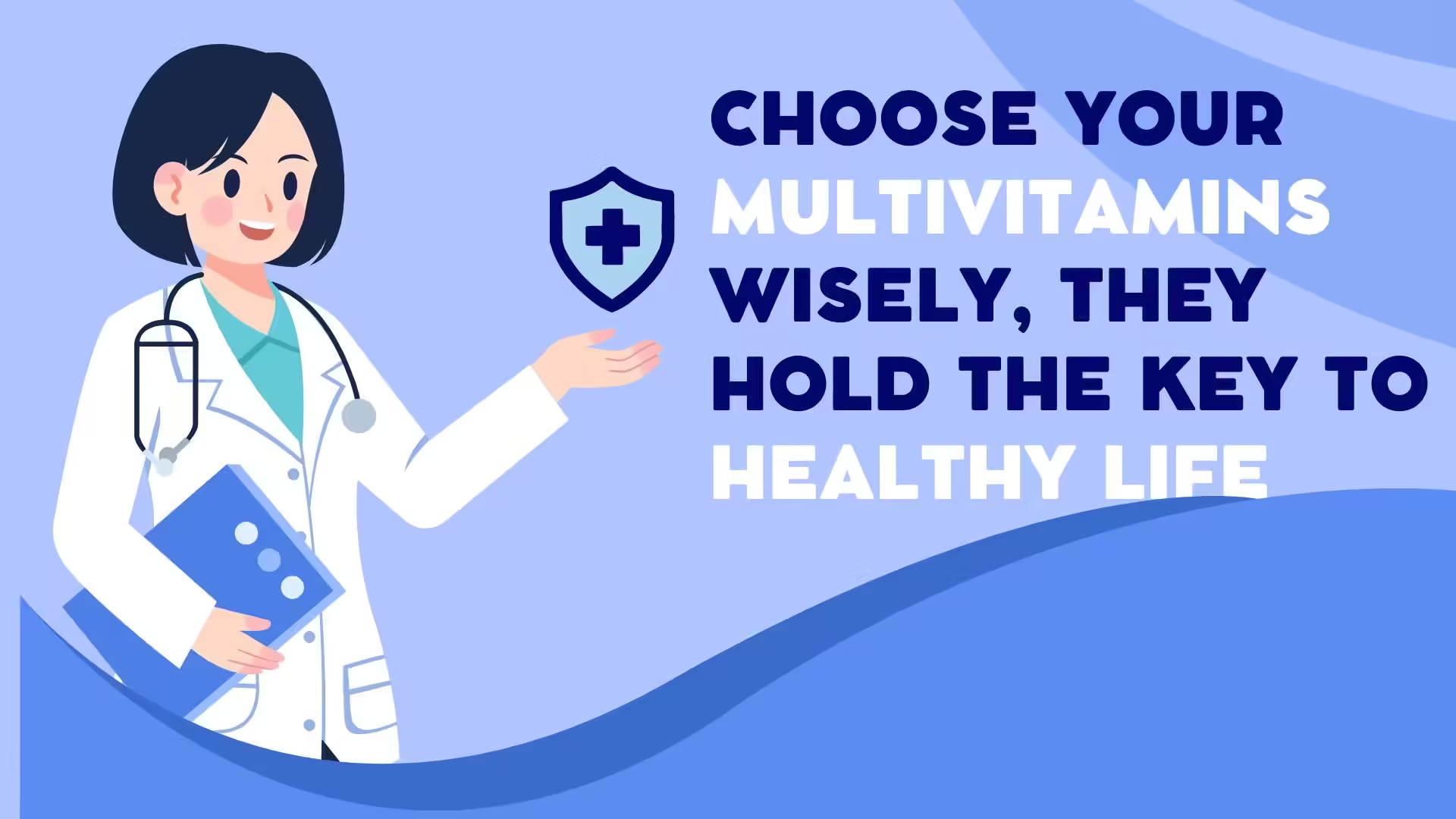Hello, Beautiful People! Do you also feel selection of multivitamin is difficult? It is because there are so many options available. We all know that vitamins and minerals provide best health but don’t know how to take them.
This blogpost will help you go through the multivitamin path. After this, you will easily select a product that meets your nutritional needs.
We’ll cover how to check your dietary gaps. We’ll understand different formulations, and see quality. Subsequently, you’ll be aware to make an informed choice according to your individual health requirements.
Let’s see what’s more!
Nutritional Needs

Common vitamin deficiencies include:
Individual Needs of Multivitamin
One thing you need to understand as parents is, nutritional needs are different for different children. This difference is on the basis of:
- Age: Children and seniors have different vitamin requirements. Old people need more calcium and vitamin D.
- Gender: Women need more iron due to menstruation.
- Way of Living: Active individuals need higher levels of vitamin B-complex for energy generation.
- Health Conditions: Some conditions like pregnancy, or recovery from surgery can enhance the need for nutrients.
Types of Multivitamins
Type | Description | Pros | Cons |
General Multivitamins | Basic preparations suitable for most adults. | Wide coverage of main vitamins and minerals. | May not inspect individual needs. |
Gender-Specific | Put together for men or women. Label unique nutritional requirements. | Featured nutrient profile for gender specific needs. | May include ingredients not needed for some individuals. |
Age-Specific | Designed for different life stages:
| Age-appropriate nutrient levels. | Can be less effective if not according to age. |
Prenatal | Prepared for pregnant women to support fetal development and maternal health. | Contains necessary nutrients like folic acid and iron. | Not suitable for those not pregnant. |
Performance/Active | Targeted at athletes or highly active individuals to support energy, recovery, and muscle function. | Higher levels of energy-supporting vitamins. | May be extreme for sedentary individuals. |
Immune Support | Includes vitamins and minerals known to boost the immune system, like vitamin C, D, and zinc. | Increased support for the immune system. | Not necessary for people with a balanced diet. |
Beauty | Focuses on vitamins and minerals that promote healthy skin, hair, and nails. | Makes better appearance and health of skin, hair, nails. | Limited overall health benefits. |
Senior | Prepared to address the nutritional needs of older adults, often with higher calcium and vitamin D. | Supports bone health and overall wellness. | Not good for younger people. |
Children’s | Designed for children with appropriate doses of essential vitamins and minerals. | Kid-friendly forms and flavors. | Not suitable for adults due to lower dosages. |
Vegan/Vegetarian | Free from animal products, tailored to the nutritional needs of those on plant-based diets. | Suitable for vegetarians. | May be more expensive. |
Allergen-Free | Prepared without common allergens like gluten, dairy, nuts, and soy. | Safe for individuals with allergies. | Limited selection and can be more costly. |
Gummy Multivitamins | Chewable vitamins are often flavored and designed for those who have difficulty swallowing pills. | Easy and enjoyable to consume. | Often contain added sugars and may have lower nutrient levels. |
Liquid Multivitamins | Liquid form, often easier to digest and absorb, suitable for those with digestive issues. | Easy engulf and best for those with swallowing issues. | Shorter shelf life and may have an bad taste. |
Powdered Multivitamins | Powder form, mixable with water or other beverages, suitable for those who prefer not to take pills. | Changeable doses and easy to mix. | Can be difficult to measure and mix daily. |
Key Ingredients to Look For Essential Vitamins
Vitamin A: Holds up:
- Vision
- Immune function
- Skin health.
B-Complex Vitamins: Includes:
- B1 (thiamine)
- B2 (riboflavin)
- B3 (niacin)
- B5 (pantothenic acid)
- B6 (pyridoxine)
- B7 (biotin)
- B9 (folic acid)
- B12 (cobalamin).
Vitamin C: It is a strong antioxidant that holds up:
- Immune system
- Skin health
- Wound healing.
Vitamin D: It is necessary for:
- Bone health
- Immune function
- Mood regulation.
Vitamin E: Antioxidant that:
- Protects cells from damage
- Supports immune function
- Promotes skin health.
Vitamin K: It is necessary for:
- Blood clotting
- Bone health.
Important Minerals
- Calcium
- Magnesium
- Zinc
- Iron
- Selenium
Additional Ingredients for Multivitamin
- Antioxidants
- Probiotics
- Omega-3 Fatty Acids
- Plant Products
The following video shows truth about multivitamins:
Quality and Safety Considerations
You should pick out a multivitamin from a brand that has a good reputation. This is important to make sure quality and safety. Moreover, respected brands are more likely to follow strict manufacturing standards.
Hunt for brands that have a history of openness and positive analysis. Look for companies that provide detailed information about:
- Product sourcing
- Manufacturing processes
- Ingredient transparency.
Certifications for Multivitamin
You should look for third-party testing that proves the quality and safety of the multivitamin. Some reputable certifications include:
- United States Pharmacopeia
- National Sanitation Foundation
- Good Manufacturing Practices
Ingredient Sources
Check out the source of the ingredients used in the multivitamin. Natural vitamins and minerals are taken from food sources and are. They’re generally preferred for less additives. Synthetic vitamins are made through chemical processes. They are not absorbed well by the body. Check out for the products that contain natural sources. Also, stay away from those with artificial preservatives.
Avoid Harmful Additives
Examine the label for any potentially harmful additives or fillers. Common additives to avoid include:
- Artificial Flavors
- Preservatives
- Fillers and Binders
Potential Allergens
If you have food allergy, check for allergens. Common allergens include:
- Gluten
- Dairy
- Soy
- Nuts
- Shellfish.
breakfast, digestive supplements, multivitamin, mental calmness supplements and Kratom pic.twitter.com/NgVdQnwhFe
— Okelani V (@ov40wl) July 22, 2024
Reading Labels and Dosage
Checking the daily values (DVs) listed on a multivitamin label is important. When reading labels:
- % DV: Shows how much of each nutrient is provided per serving.
- Higher vs. Lower Percentages: Try to take higher percentages of main nutrients you are deficient in and avoid high percentages of nutrients.
Avoid Overdosing
Multivitamins are designed to supplement your diet, but do not exceed the recommended dosage. This can cause severe effects. Main points are:
- Upper Limits: Be aware of Tolerable Upper Intake Levels of nutrients.
- Fat-Soluble Vitamins: Vitamins A, D, E, and K are stored to toxic levels.
- Iron and Calcium: They can cause gastrointestinal issues.
Inactive Ingredients
Inactive ingredients are used to make the vitamin. They do not provide nutritional value. These include:
- Fillers: Substances used to add up the vitamin.
- Binders: Ingredients that hold the tablet together.
- Coatings: Materials that make the tablet easier to swallow.
Form and Bioavailability
The form of a vitamin or mineral can affect how good the body can absorb. For example:
- Vitamin B12
- Calcium
Serving Size and Frequency of Multivitamin
Multivitamin labels show serving sizes and how often to take them. Common formats include:
- Once Daily: Easy and makes consistent intake.
- Multiple Times Daily: May provide better absorption but requires more effort to remember.
Special Considerations About Multivitamin
- Children and Seniors: Make sure that multivitamins are appropriate according to age with suitable dosages.
- Pregnancy: Prenatal vitamins should meet the specific nutritional needs of pregnant women, such as higher folic acid.
Personal Preferences and Lifestyle
When selecting a multivitamin, consider any dietary restrictions or preferences you may have:
- Vegan/Vegetarian
- Gluten-Free
- Allergen-Free
Ease of Use
Look carefully the form of the multivitamin that best suits your lifestyle:
- Tablets/Capsules: They are most cost-effective. You should choose them if you don’t have issue ingulfing pills.
- Gummies: They are enjoyable to eat. They may contain added sugars and fewer nutrients.
- Powders: They can be mixed with water or smoothies. Best for those who prefer a drinkable option.
- Liquids: Easy to take in and often absorbed more quickly. They are good for individuals with digestive issues.
Taste and Swallowability of Multivitamin
Taste and the ability to swallow supplements are important factors:
- Gummies and Chewables: Generally taste better and are easier to consume for children.
- Liquid Multivitamins: Can be mixed with beverages but may still be less pleasant for some.
- Capsules: They have no taste and easy to swallow than large tablets.
Lifestyle and Convenience
Your daily routine and lifestyle can impact your choice:
- Busy Schedules: If you have a busy day, take one multivitamin.
- Travel-Friendly: During traveling carry capsules.
- Fitness Enthusiasts: You should take multivitamins of B vitamins.
Special Health Goals
If you have particular health goals, select a multivitamin designed to those needs:
- Immune Support
- Bone Health
- Skin
- Hair
- Nails
Ethical Considerations of Multivitamin
For environmentally awareness of individuals, consider:
- Sustainable Sourcing
- Ethical Practices
Conclusion
Lastly, selecting the right multivitamin is the main factor to adding extra to your diet. Furthermore, it supports your overall health.
By understanding your nutritional needs, assessing different types of multivitamins, you can make a great decision.
Remember to seek advice with a healthcare provider for personal advice. In addition to that, make sure compatibility with your individual health profile.
A balanced approach to supplementation can help boost up your overall health. It also makes sure you receive main vitamins and minerals needed for liveliness and long life.
Let me know which vitamin you think is the best for you?
FAQ
- Why should I start multivitamin?
Multivitamins are supplements. They provide main vitamins and minerals. Finally, they can help fill your nutritional gaps.
- What factors should I consider to take supplements?
Consider factors such as your:
- Diet
- Lifestyle
- Age
- Health conditions.
- What are factors in a multivitamin?
Main factors include:
- Essential Nutrients
- Quality
- Absorption
- What are dangers of multivitamins?
Multivitamins are normally safe. The danger of overdosing is majorly due to vitamins like:
- Vitamin A
- Vitamin D.
- Can multivitamins compensate for a healthy diet?
Multivitamins are supplements. They do not replace a healthy diet. They can help fill the nutritional gaps.




